St. Francis of Assisi Weekly Reflections

Let the Holy Spirit Guide You
05-31-2020Weekly ReflectionWe Celebrate Worship Resource, Vol. 45, No. 2Comprehension of speech is pretty much dependent on two people: the speaker and the listener. Even if the two speak a common language, the listener may have difficulty understanding if the speaker has a heavy accent. This dynamic comes into play in Luke’s account of Pentecost. Filled with the Holy Spirit, the disciples were able to speak in different tongues. This attracted people from over a dozen regions, each one able to hear them “speaking in (their) own tongues of the might acts of God” (Acts 2:11). In order to comprehend what they were hearing, they must have overcome the difficulty of understanding someone speaking their own language with a foreign accent. After all, even with the disciples inside a house the crowd recognized their voices as Galilean, which we know was a distinctive accent because it had given Peter away when he denied knowing Jesus. Yet they were still able to comprehend the meaning of their words. Saint Paul’s letter to the Corinthians lists some examples of the different gifts the Holy Spirit brings, including both “varieties of tongues” and “interpretation of tongues” (1 Corinthians 12:10). Speaker and listener are each blessed by the Spirit. May the Holy Spirit bring us insight and comprehension as we listen to the word of God.
How does the Holy Spirit help you to hear, understand, and express the word of God?
Deja Sue el Espíritu Santo te Guíe
La comprensión del habla depende en gran medida de dos personas: el orador y el oyente. Incluso si los dos hablan un idioma común, el oyente puede tener dificultades para entender si el orador tiene un fuerte acento. Esta dinámica entra en juego en el relato de Pentecostés de Lucas. Llenos del Espíritu Santo, los discípulos pudieron hablar en lenguas diferentes. Esto atrajo a personas de más de una docena de regiones, cada una capaz de oír “hablar de las maravillas de Dios en su propia lengua” (Hechos 2:11). Para comprender lo que estaban escuchando, deben haber superado la dificultad de entender a alguien que habla su propio idioma con acento extranjero. Después de todo, incluso con los discípulos dentro de una casa, la multitud reconoció sus voces como galileanas, lo que sabemos que era un acento distintivo porque había delatado a Pedro cuando negó conocer a Jesús. Sin embargo, aún podían comprender el significado de sus palabras. La carta de San Pablo a los Corintios enumera algunos ejemplos de los diferentes dones que trae el Espíritu Santo, incluyendo tanto “diversos géneros de lenguas” como “interpretación de lenguas” (1 Corintios 12:10). El orador y el oyente son bendecidos por el Espíritu. Que el Espíritu Santo nos traiga perspicacia y comprensión mientras escuchamos la palabra de Dios.
¿Cómo te ayuda el Espíritu Santo a escuchar, comprender y expresar la palabra de Dios?

I Am With You Always Until The End
05-24-2020Weekly ReflectionWe Celebrate Worship Resource, Vol. 45, No. 2Whenever there is doubt about something that happened, you hope that there were witnesses. When a contract is signed or a couple gets married, there need to be witnesses. As Jesus bids farewell to his disciples he instructs them to “be my witnesses...to the ends of the earth” (Acts 1:8). Because they did so, the early church, the body of Christ as Paul calls it, grew and flourished despite the persecution it suffered for many years. The disciples who had worked with Jesus became witnesses who testified in Jesus’ name. But it did not end with them, for others who had not personally encountered Jesus in the flesh were commissioned to witness as well. How were they able to witness, even with the power of the Holy Spirit that Jesus promised? The last line of the Gospel reveals the answer: “I am with you always” (Mathew 28:20). Jesus was not just with the disciples who knew him before his death and resurrection, he was with the early church, and he is still with us now. Therefore, we are to be his witnesses also, testifying to his presence in us, in others, in the Eucharist. We can do this, for “all power in heaven and on earth” is behind us (28:18).
How can you be a witness to Jesus’ presence here and now?
Yo Estaré Con Ustedes Hasta El Final
Siempre que hay dudas sobre algo que sucedió, esperas que hayan testigos. Cuando se firma un contrato o una pareja se casa, es necesario que hayan testigos. Cuando Jesús se despide de sus discípulos, les instruye que “sean mis testigos... hasta los últimos rincones de la tierra” (Hechos 1:8). Porque así lo hicieron, la iglesia primitiva, el cuerpo de Cristo como lo llama Pablo, creció y floreció a pesar de la persecución que sufrió durante muchos años. Los discípulos que habían trabajado con Jesús se convirtieron en testigos que testificaron en el nombre de Jesús. Pero no terminó con ellos, ya que otros que no se habían encontrado personalmente con Jesús en la carne también fueron comisionados para testificar. ¿Cómo pudieron testificar, incluso con el poder del Espíritu Santo que Jesús prometió? La última línea del Evangelio revela la respuesta: “Yo estaré con ustedes” (Mateo 28:20). Jesús no solo estaba con los discípulos que lo conocieron antes de su muerte y resurrección, estaba con la iglesia primitiva y todavía está con nosotros ahora. Por lo tanto, debemos ser sus testigos también, testificando su presencia en nosotros, en otros, en la Eucaristía. Podemos hacer esto, porque “todo poder en el cielo y en la tierra” está con nosotros (28:18).
¿Cómo puedes ser testigo de la presencia de Jesús aquí y ahora?

Connected by Love
05-17-2020Weekly ReflectionWe Celebrate Worship Resource, Vol. 45, No. 2We are all connected. John tells us in the Gospel that through Jesus and the Holy Spirit, we are not orphaned. We are connected with our fellow believers and with God. Before that, we hear that Philip, whose commissioning was proclaimed last Sunday, decides to go to Samaria, of all places. Recall that Jesus purposely chose a Samaritan to illustrate what it means to be a neighbor, caring for the injured man who had been ignored by his own people. The Samaritans welcome Philip and accept God’s word. As a sign of unity within the early church, Peter and John, two of the Twelve, travel to Samaria to call down the holy spirit on all those who had been baptized into the faith. The Samaritans, once regarded as outcasts, are now connected to the disciples, the apostles, Jesus, and the Holy Spirit. What is the glue that holds all of them (and us) together? It is love. It is love that leads one to want to keep Jesus’ commandments, love that binds each person of the Trinity, love that reveals the presence of Jesus to others. Indeed, in this love we “sanctify Christ as Lord in (our) hearts” (1 Peter 3:15).
How does your connectedness to your neighbor affect the way you treat others?
Conectados por Amor
Todos estamos conectados. Juan nos dice en el Evangelio que a través de Jesús y el Espíritu Santo, no estamos huérfanos. Estamos conectados con nuestros compañeros creyentes y con Dios. Antes de eso, escuchamos que Felipe, cuya comisión fue proclamada el domingo pasado, decide ir a Samaria, de todos los lugares. Recuerda que Jesús eligió en propósito a un samaritano para ilustrar lo que significa ser un vecino, cuidando al hombre herido que había sido ignorado por su propia gente. Los samaritanos dan la bienvenida a Felipe y aceptan la palabra de Dios. Como un signo de unidad dentro de la iglesia primitiva, Pedro y Juan, dos de los Doce, viajan a Samaria para invocar al Espíritu Santo sobre todos los que han sido bautizados en la fe. Los samaritanos, una vez considerados marginados, ahora están conectados con los discípulos, los apóstoles, Jesús y el Espíritu Santo. ¿Cuál es el pegamento que los mantiene unidos a todos (y a nosotros)? Es amor. Es el amor lo que lleva a uno a querer guardar los mandamientos de Jesús, el amor que une a cada persona de la Trinidad, el amor que revela la presencia de Jesús a los demás. De hecho, en este amor “veneramos a Cristo como Señor en (nuestros) corazones” (1 Pedro 3:15).
¿Cómo afecta tu conexión con tu prójimo la forma en que tratas a los demás?

Let Jesus Guide your Way
05-10-2020Weekly ReflectionWe Celebrate Worship Resource, Vol. 45, No. 2Today’s Gospel passage takes place at the Last Supper, when Jesus tells his disciples that he will be leaving them. No wonder he starts by reassuring them, “Do not let your hearts be troubled” (John 14:1). But Thomas’ heart was troubled, for he thought that the way Jesus was going was unknowable. Jesus assures him, “I am the way and the truth and the life” (John 14:6). There is no reason to be troubled, Jesus shows us the way. He is the way. He also guides us to the truth, something a troubled Pilate never understood. Finally, he is the life. As he often explained to his disciples, they would find life in being willing to lose it, just as he soon would. In Jesus we have our path, our certainty, our very being. We trust that he will guide us home. In fact, since Jesus is already in us, we are already home. As Peter says, we can be “a spiritual house” (1 Peter 2:5), welcoming those in need; as the disciples did in Jerusalem. Therefore, we celebrate Easter not just for a single day or even for just a season, but always. Every day, the risen Lord guides our way.
How does Jesus guide your way? How can his presence within you lead you to accomplish great works?
Deja que Jesús Guié tu Camino
El pasaje del Evangelio de hoy toma lugar en la Última Cena, cuando Jesús les dice a sus discípulos que los dejará. No es de extrañar que comience asegurándoles: “No se turbe vuestro corazón” (Juan 14:1). Pero el corazón de Tomás estaba preocupado, porque pensó que la forma en que Jesús procedía era desconocida. Jesús le asegura: “Yo soy el camino, la verdad y la vida” (Juan 14:6). No hay razón para preocuparse, Jesús nos muestra el camino. Él es el camino. También nos guía a la verdad, algo que el desconcertado de Pilato nunca entendió. Finalmente, Él es la vida. Como a menudo explicaba a sus discípulos, encontrarían la vida estando dispuestos a perderla, tal como Él pronto lo haría. En Jesús tenemos nuestro camino, nuestra certeza, nuestro propio ser. Confiamos en que nos guiará a casa. De hecho, como Jesús ya está en nosotros, ya estamos en casa. Como dice Pedro, podemos ser “una casa espiritual” (1 Pedro 2:5), dando la bienvenida a los necesitados; como lo hicieron los discípulos en Jerusalén. Por lo tanto, celebramos la Pascua no solo por un solo día o incluso solo por una temporada, sino por siempre. Todos los días, el Señor resucitado guía nuestro camino.
¿Cómo guía Jesús tu camino? ¿Cómo puede su presencia dentro de ti llevarte a realizar grandes obras?
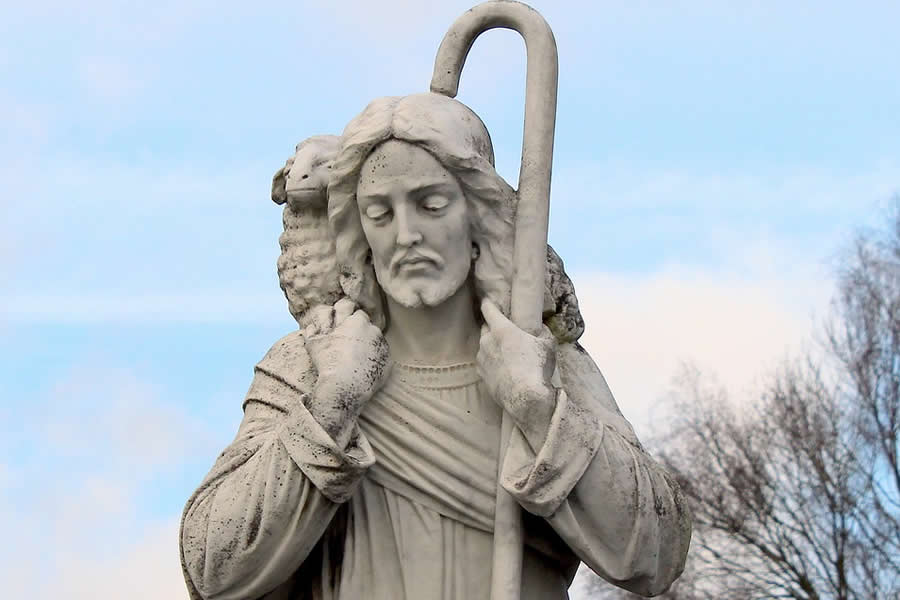
Live an Abundant Life
05-03-2020Weekly ReflectionWe Celebrate Worship Resource, Vol. 45, No. 2Jesus is the Good Shepherd, as we well know, though the Gospel we hear today ends just before he makes that assertion. Instead, in today's Gospel Jesus says twice, "I am the gate" (John 10:7, 9). Jesus is not only the one who leads the sheep to pasture, protects them from harm, and cares for them as his own. He is also the one who provides a way for them to go out for sustenance and exercise, then come in for safety and rest. How does the gate function for us? Peter's speech in the first reading gives us a clue. He speaks to the people of Jerusalem, many of whom probably had shouted "Crucify him!" when Jesus was on trial. Peter tells them, "Repent and be baptized" (Acts 2:38), and receive forgiveness and the Holy Spirit. He knows this personally, for he too let Jesus down, denying him three times. Through the risen Lord, he received forgiveness and the Holy Spirit. We too repent and ask for forgiveness. Jesus, the gate, welcomes us home so we may "have life and have it more abundantly" (John 10:10).
How do you imagine having life more abundantly?
Vive la Vida en Abundancia
Jesús es el Buen Pastor, como bien sabemos, aunque el Evangelio que escuchamos hoy termina justo antes de hacer esa afirmación. En cambio, en el Evangelio de hoy, Jesús dice dos veces:"Yo soy la puerta" (Juan 10:7, 9). Jesús no es solo el que lleva a las ovejas al pasto, las protege del daño y las cuida como si fueran suyas. Él también es quien les proporciona una forma de salir para sustento y ejercicio, y luego la entrada para seguridad y descanso. ¿Cómo funciona esta puerta para nosotros? El discurso de Pedro en la primera lectura nos da una pista. Él le habla al pueblo de Jerusalén, muchos de los cuales probablemente habían gritado "¡Crucifícalo!" cuando Jesús estaba en juicio. Pedro les dice: "Arrepiéntanse y sean bautícese" (Hechos 2:38), y reciban el perdón y el Espíritu Santo. Él lo sabe personalmente, porque él también decepcionó a Jesús, negándolo tres veces. A través del Señor resucitado, recibió el perdón y el Espíritu Santo. También nos arrepentimos y pedimos perdón. Jesús, la puerta, nos da la bienvenida a casa para que podamos "tener vida y tenerla en abundancia" (Juan 10:10).
¿Cómo te imaginas tener una vida más abundante?
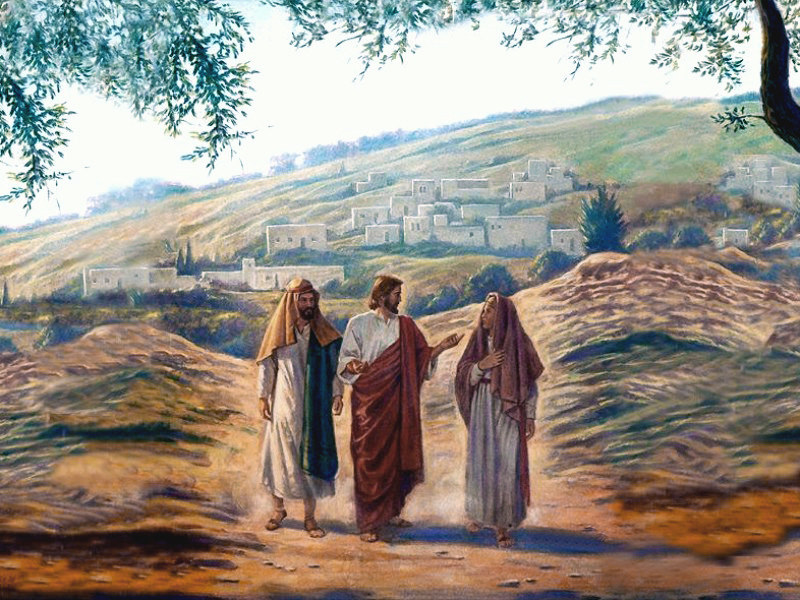
Recongizing Jesus
04-26-2020Weekly ReflectionWe Celebrate Worship Resource, Vol. 45, No. 2When Jesus was born, he was recognized at once. Everyone who came to the stable in Bethlehem, from the shepherds to the magi, understood that he was the Messiah. Even Herod realized it. But recognition was slow in coming when Jesus rose from the dead. Those who entered the empty tomb on Easter morning “did not yet understand the Scripture that he had to rise from the dead” (John 20:9). Last week we heard Thomas assert, “Unless I see...I will not believe” (John 20:25). Today we hear the two disciples walking to Emmaus. Luke writes that “their eyes were prevented from recognizing him” (Luke 24:16). Perhaps he was being kind and the disciples were simply too distracted by their conversation to notice whom they were speaking with. Perhaps the risen Lord looked markedly different. Whatever the reason, it was not until Jesus blessed, broke, and shared the bread that “their eyes were opened and they recognized him” (Luke 24:31). Recognition and understanding simply did not come at once, not for the disciples at the tomb, not for Thomas, and not for these two disciples. Recognizing the risen Lord took time.
How are you failing to recognize Jesus today?
Reconociendo a Jesús
Cuando Jesús nació, fue reconocido de inmediato. Todos los que vinieron al establo en Belén, desde los pastores hasta los magos, entendieron que él era el Mesías. Incluso Herodes se dio cuenta. Pero el reconocimiento tardó en llegar cuando Jesús resucitó de entre los muertos. Aquellos que entraron a la tumba vacía en la mañana de Pascua “aún no habían entendido la Escritura, que era necesario que él resucitase de los muertos” (Juan 20:9). La semana pasada escuchamos a Tomás afirmar: “Si no veo...no creeré” (Juan 20:25). Hoy escuchamos a los dos discípulos caminando hacia Emaús. Lucas escribe que “sus ojos no pudieron reconocerlo” (Lucas 24:16). Quizás estaba siendo amable y los discípulos simplemente estaban demasiado distraídos por su conversación para darse cuenta de con quién estaban hablando. Quizás el Señor resucitado parecía marcadamente diferente. Cualquiera que fuese la razón, no fue hasta que Jesús bendijo, partió y compartió el pan que “se les abrieron los ojos y lo reconocieron” (Lucas 24:31). El reconocimiento y la comprensión simplemente no llegaron de inmediato, ni para los discípulos en la tumba, ni para Tomás, ni para estos dos discípulos. Reconocer al Señor resucitado tomó tiempo.
¿Cómo fallas en reconocer a Jesús hoy?

Oh, Blessed Thomas
04-19-2020Weekly ReflectionWe Celebrate Worship Resource, Vol. 45, No. 2Poor Thomas. He misses one gathering and it turns out to be he one at which Jesus makes his first post-Resurrection appearance. When he returns, they tell him they have seen the Lord. Incredulous Thomas. This must be some crazy collective delusion. He refuses to believe Jesus is risen. Doubting Thomas. Not just a week later, but thanks to this passage from John, for all time. But doubt is just the first stop on the road to faith. All the disciples doubted at first. None of them believed until they saw him, not at the tomb, not on the road, not in the locked room. They first had to be willing to accept what hey could not prove, what was still unknown. The apostles in Acts could not have known when they sold their property and possessions that it would all work out. But they willing to believe that it would. Those who read the first letter of Peter could not know that suffering through various trials would eventually result in rejoicing with an indescribable and glorious joy. So, in the end: Blessed Thomas. He has modeled for us the first step to faith.
How do you overcome doubt and believe what you cannot see or prove?
Oh, Bendito Tomás
Pobre Tomás. Faltó a una reunión y resultó ser aquella en la que Jesús hace su primera aparición posterior a la resurrección. Cuando regresó, le dijeron que habían visto al Señor. El incrédulo Thomas. Esto debe ser un loco engaño colectivo. Se niega a creer que Jesús ha resucitado. Tomás el incrédulo. No solo una semana después, sino gracias a este pasaje de Juan, por todos los tiempos. Pero la duda es solo la primera parada en el camino hacia la fe. Todos los discípulos dudaron al principio. Ninguno de ellos creyó hasta que lo vieron, ni en la tumba, ni en el camino, ni en la cuarto cerrado. Primero tenían que estar dispuestos a aceptar lo que no podían comprobar, lo que aún era desconocido. Los apóstoles en Hechos no podrían haber sabido cuando vendieron sus propiedades y posesiones que todo saldría bien. Pero estaban dispuestos a creer que así sería. Aquellos que leyeron la primera carta de Pedro no podían saber que el sufrimiento a través de varias pruebas eventualmente resultaría en regocijarse con una alegría indescriptible y gloriosa. Entonces, al final: Beato Thomas. Él nos ha modelado el primer paso de la fe.
¿Cómo superas la duda y crees en lo que no puedes ver o comprobar?
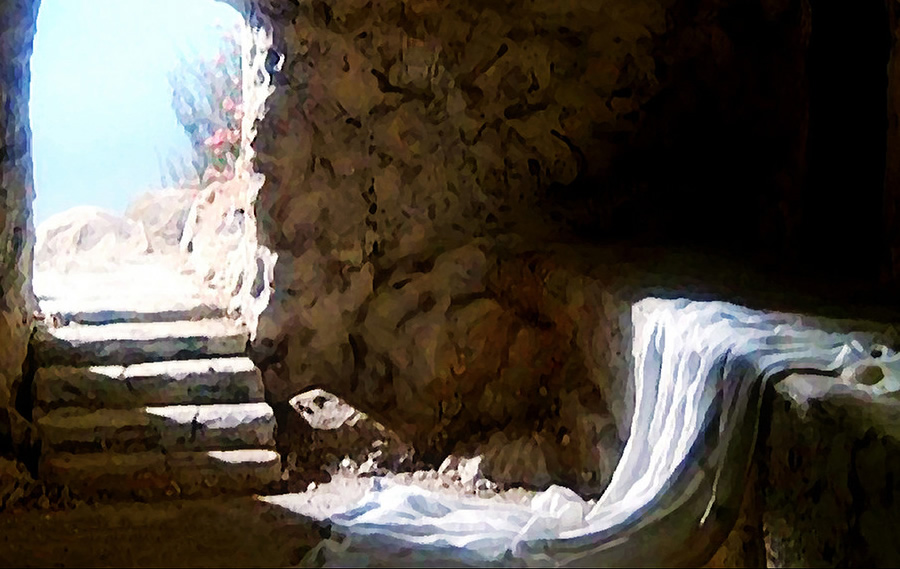
He is Risen
04-12-2020Weekly ReflectionWe Celebrate Worship Resource, Vol. 45, No. 2Today we celebrate Jesus’ victory over death. He is risen! Death is not the end. But the Resurrection is not the end either. The world did not end on that first Easter Sunday. Those who discovered the empty tomb ran to tell the other disciples. The disciples, who would soon be visited by the resurrected Jesus, were sent out to convey the good news to the ends of the earth. Those witnesses, evangelized by the original disciples, were called in turn to give witness to others. Generation after generation, the testimony continued. Now, dozens of generations later, we receive the Risen Lord through the word and the Eucharist, then attest to his abiding presence in our lives. In doing so, we follow in the footsteps of Peter and Paul, testifying in word and action to the One who loves us, forgives us, and has redeemed us. We put ourselves in God’s hands, readying ourselves for the new yeast. Like a fresh batch of dough, with new yeast we too shall rise. With this in mind, we renew our baptismal promises every Easter. Promising to serve God by our lives, we are reborn with water and the Holy Spirit, assured forgiveness of our sins, and graced with the promise of eternal life by the One who has conquered death and sin.
How can you witness to the promise of the Resurrection in the way that you live?
¡Él Ha Rsucitado!
Hoy celebramos la victoria de Jesús sobre la muerte. ¡Él ha resucitado! La muerte no es el fin. Pero la resurrección tampoco es el final. El mundo no terminó ese primer domingo de Pascua. Los que descubrieron la tumba vacía corrieron a contarle a los otros discípulos. Los discípulos, que pronto serían visitados por el Jesús resucitado, fueron enviados a transmitir las buenas nuevas hasta los confines de la tierra. Esos testigos, evangelizados por los discípulos originales, fueron llamados a su vez para dar testimonio a otros. Generación tras generación, el testimonio continuó. Ahora, docenas de generaciones después, recibimos al Señor Resucitado a través de la palabra y la Eucaristía, y luego damos fe de su presencia permanente en nuestras vidas. Al hacerlo, seguimos los pasos de Pedro y Pablo, testificando en palabra y acción a Aquel que nos ama, nos perdona y nos ha redimido. Nos ponemos en las manos de Dios, preparándonos para la nueva levadura. Como un nuevo lote de masa, con levadura nueva nosotros también nos levantaremos. Con esto en mente, renovamos nuestras promesas bautismales cada Pascua. Prometiendo servir a Dios por nuestras vidas, renacemos con agua y el Espíritu Santo, con el perdón de nuestros pecados seguro y honrados con la promesa de vida eterna de Aquel que venció la muerte y el pecado.
¿Cómo puedes dar testimonio de la promesa de la resurrección en la forma en que vives?
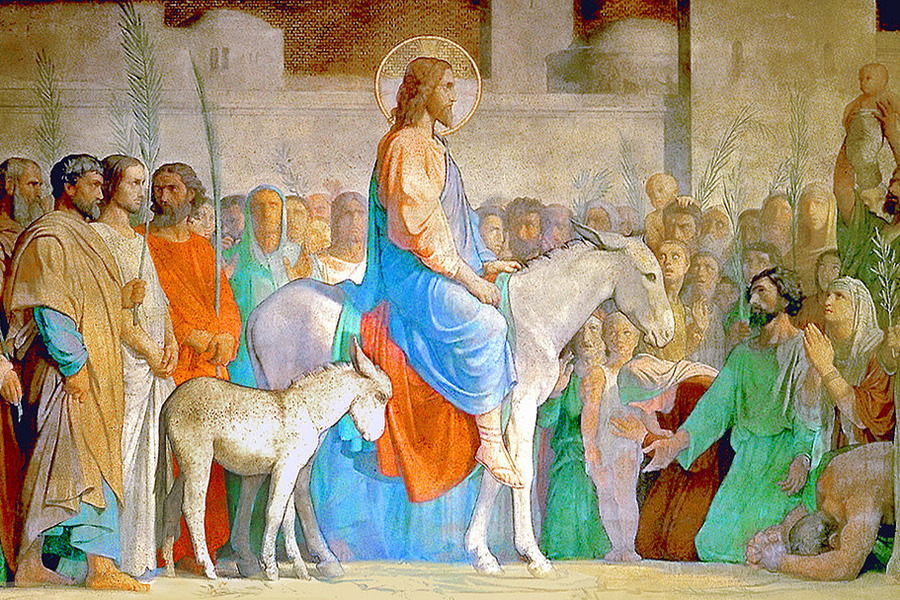
Imagine Yourself in Each Crowd
04-05-2020Weekly ReflectionWe Celebrate Worship Resource, Vol. 45, No. 1Traditionally, two Gospels are read on Palm Sunday: one featuring Jesus’ triumphant entrance into Jerusalem and the other recounting his Passion, from the Last Supper to his death and burial. Throughout the entire time, Jesus is faithful to his mission and to his Father’s will. But the difference in the crowds in their two key scenes couldn’t be starker. As Jesus rides into Jerusalem, the crowds treat him as royalty, crying out hosannas as they cover the dirt road with tree branches and their own cloaks. But during his trial, the crowd has completely turned against him. It is not enough that they are no longer honoring and praising him. Now they are crying out, “Let him be crucified” (Matthew 27:22, 23). Their behavior recalls the actions of the people in today’s first reading who strike and spit at Isaiah’s suffering servant, abusing him as the religious leaders and soldiers would do to Jesus at his trial. Like the suffering servant, Jesus “humbled himself, becoming obedient to the point of death” (Philippians 2:8). Because of this, for generation upon generation, crowds of people all over the world have bent their knee at the name of Jesus, as we do here today, praising him for offering his life for us, calling upon him for strength to accept our own sufferings, and confessing him as Lord.
READ MORE
Eternal Life within us
03-29-2020Weekly ReflectionWe Celebrate Worship Resource, Vol. 45, No. 1Martha and Mary were desperate. Their beloved brother was dying. So close are they to one another and to Jesus that when they sent word to him they simply said, "The one you love is ill," confident that he would know they are speaking of Lazarus (John 11.3). They knew Jesus would want to be there with them, to comfort them, and maybe, hope against hope, to do something. If he could heal complete strangers, surely he could keep Lazarus from dying. When Lazarus died before Jesus came they were beside with grief. Four days after his burial, when Jesus finally arrived, Martha and Mary each went to him, weeping for the loss of their brother. Lazarus's friends wept with them. Martha and Mary's friends wept too, seeing the pain the women were enduring. And Jesus wept. But in the midst of all this, Jesus brought hope. No doubt Martha and Mary were familiar with Ezekiel's prophecy that we hear today: "I will open your graves and have you rise from them" (Ezekiel 37:12). Here and now, to these women he loved, Jesus reveals that he himself is the resurrection. In him life is eternal. Martha, Mary, Lazarus, and all who believe already have eternal life within them.
How does knowing that you can have eternal life within you affect the way you live your life?
Vida Eterna Dentro de Nosotros
Marta y María estaban desesperadas. Su querido hermano se estaba muriendo. Están tan cerca unos de otros y de Jesús que cuando le enviaron un mensaje le dijeron simplemente: "El que tanto quieres está enfermo", confiando en que sabría que están hablando de Lázaro (Juan 11:3). Sabían que Jesús querría estar allí con ellos, consolarlos, y tal vez, con esperanza, hacer algo. Si podía curar a completos extraños, seguramente podría evitar que Lázaro muriera. Cuando Lázaro murió antes de que Jesús llegara, estaban a su lado con dolor. Cuatro días después de su entierro, cuando Jesús finalmente llegó, Marta y María fueron cada una a él, llorando por la pérdida de su hermano. Los amigos de Lázaro lloraron con ellas. Las amigas de Martha y María también lloraron al ver el dolor que soportaban las mujeres. Y Jesús lloró. Pero en medio de todo esto, Jesús trajo esperanza. Sin duda, Marta y María estaban familiarizadas con la profecía de Ezequiel que escuchamos hoy: "Abriré sus sepulcros, los haré salir de ellos" (Ezequiel 37:12). En ese momento, Jesús le reveló a estas mujeres que amaba, que él mismo es la resurrección. En él, la vida es eterna. Marta, María, Lázaro y todos los que creen ya tienen vida eterna dentro de ellos.
¿Cómo el saber que puedes tener la vida eterna dentro de ti afecta la forma en que vives tu vida?
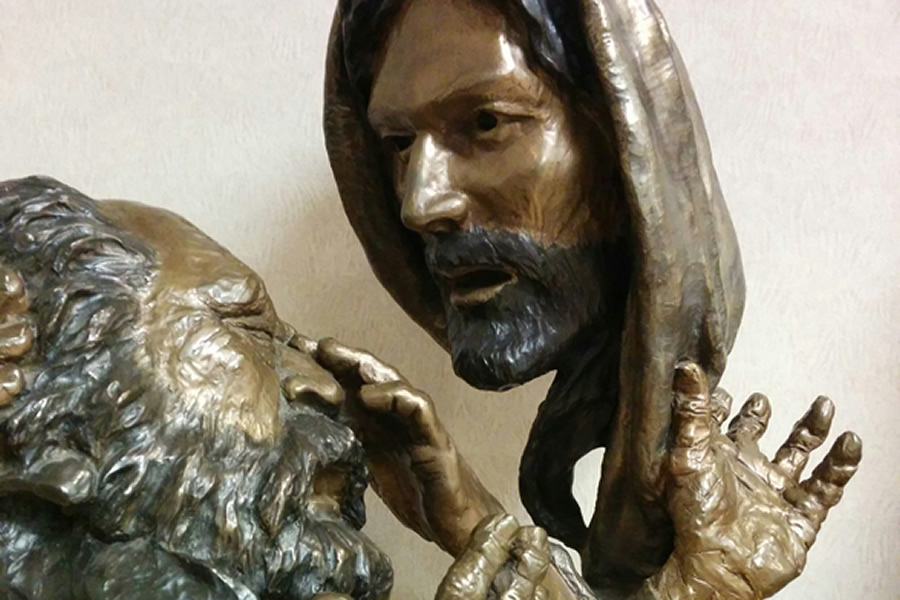
Look Beyond
03-22-2020Weekly ReflectionWe Celebrate Worship Resource, Vol. 45, No. 1Appearances can deceive us. They deceived Samuel as well as David, the youngest of Jesse's sons, forgotten while his brothers were paraded before Samuel. We do not see as God sees because we have a tendency to judge by appearances while God looks deeper. Ironically it is the blind man in the Gospel who ends up seeing Jesus most clearly. His ability to see steadily deepens, from knowing only Jesus' name, to affirming him as a prophet, to realizing he was from God, to recognizing him as the Son of Man. Meanwhile, the Pharisees' sight becomes more and more shallow. As first, they were divided, with some thinking Jesus could be from God. But in the end, they rejected both Jesus (for not keeping the sabbath) and the healed man (because they equated his disability with sin). For the Pharisees', surface appearances won out over deeper truth. To us Paul's terms, they chose to live in darkness. Christ, the light of the world, calls us to live as children of light. We are encouraged to look more deeply and allow others to see us more deeply. To do so, we must be willing to look beyond appearances.
What superficial judgments block your ability to see moredeeply?
Mira más Allá
Las apariencias pueden engañarnos. Engañaron tanto a Samuel como a David, el hijo menor de Jesse, olvidado mientras sus hermanos desfilaban ante Samuel. No vemos lo que Dios ve porque tenemos una tendencia a juzgar por las apariencias mientras Dios mira más profundamente. Irónicamente, es el hombre ciego en el Evangelio quien termina viendo a Jesús más claramente. Su habilidad para ver constantemente se profundiza, desde conocer solo el nombre de Jesús, hasta afirmarlo como profeta, darse cuenta de que era de Dios, y reconocerlo como el Hijo del Hombre. Mientras tanto, la vista de los fariseos se vuelve cada vez más superficial. Como primero, estaban divididos, y algunos pensaban que Jesús podría ser de Dios. Pero al final, rechazaron tanto a Jesús (por no guardar el sábado) como al hombre sanado (porque equiparaban su discapacidad con el pecado). Para los fariseos, las apariencias superficiales prevalecieron sobre la verdad más profunda. Según los términos de Pablo, ellos eligieron vivir en la oscuridad. Cristo, la luz del mundo, nos llama a vivir como hijos de la luz. Se nos alienta a mirar más profundamente y permitir que otros nos vean más profundamente. Para hacerlo, debemos estar dispuestos a mirar más allá de las apariencias.
¿Cuándo te sientes abandonado por Dios? ¿Qué te ayuda a convencerte de lo contrario?
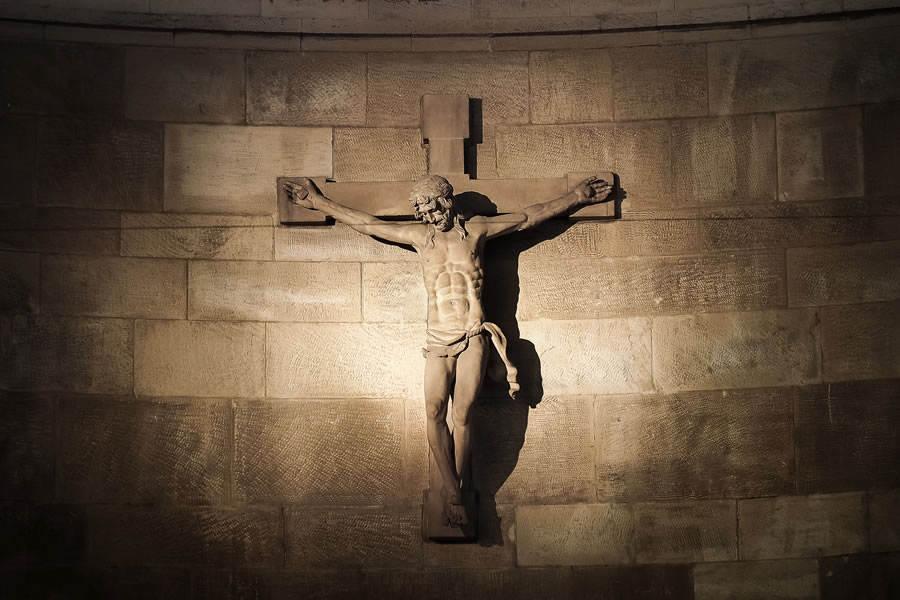
Jesus in Our Midst
03-15-2020Weekly ReflectionWe Celebrate Worship Resource, Vol. 45, No. 1Is the Lord in our midst or not? (Exodus 17:7). The Chosen People asked each other this question during their difficult journey through the barren desert, but one could imagine many of us asking the same question here and now. Whether considering the state of the world or our own personal situation, we may ask ourselves, “Where is God? Has God abandoned us?” The Samaritan woman was undoubtedly perplexed when a strange man spoke to her at the well. But after he revealed himself, she asked herself and her neighbors if the Messiah was possibly in their midst. Here she was, a Samaritan, a woman, living in a situation known to be sinful, yet she became the means through which his identity spread. Within two days, the people of the town came to believe that indeed the Messiah, the Christ, the savior of the world, was in their midst. Here and now, we are assured that Jesus is in our midst as well when we gather together in his name, when we share the Eucharistic meal, and when we go forth to carry on his mission.
When do you feel abandoned by God? What helps convince you otherwise?
Jesús Entre Nosotros
¿Está el Señor entre nosotros o no? (Éxodo 17:7). La Gente Elegida se hizo esta pregunta durante su difícil viaje a través del desierto árido, pero uno podría imaginarse a muchos de nosotros haciendo la misma pregunta aquí y ahora. Ya sea considerando el estado del mundo o nuestra propia situación personal, podemos preguntarnos: “¿Dónde está Dios? ¿Dios nos ha abandonado?” La mujer samaritana estaba indudablemente perpleja cuando un hombre extraño le habló en el pozo. Pero después de que él se reveló, ella se preguntó a sí misma y a sus vecinos si el Mesías estaba posiblemente en medio de ellos. Aquí estaba ella, una samaritana, una mujer, que vivía en una situación conocida por ser pecaminosa, pero se convirtió en el medio a través del cual se extendió su identidad. En dos días, la gente del pueblo llegó a creer que efectivamente el Mesías, el Cristo, el salvador del mundo, estaba en medio de ellos. Aquí y ahora, estamos seguros de que Jesús también está entre nosotros cuando nos reunimos en su nombre, cuando compartimos la cena eucarística y cuando salimos para llevar a cabo su misión.
¿Cuándo te sientes abandonado por Dios? ¿Qué te ayuda a convencerte de lo contrario?

How has your faith transformed you?
03-08-2020Weekly ReflectionWe Celebrate Worship Resource, Vol. 45, No. 1Can our faith transform us into someone new? Abram and Sarai were an elderly childless couple living contentedly with his family. Then God told Abram to move to a new land where he would be the father of a great nation. Though the transformation comes later, today we hear its promise and see Abram's obedient response. We know that soon God will change their names to Abraham and Sarah as an outward sign of transformation. In the second reading, we hear from another faithful person whom God renamed, Paul, who had been Saul. Writing to Timothy, Paul reminds him that their lives were transformed, as was life itself, by the resurrection of Christ Jesus. This brings us to Jesus' visible transformation in the Gospel. Jesus is transfigured before the eyes of his closest friends. As at his baptism, God speaks from the heavens, saying, "This is my beloved Son, with whom I am well pleased; listen to him" (Matthew 17:5). So we listen, as did they. His first words when this vision was complete were, "Rise, and do not be afraid" (Matthew 17:7). They did so, as did Abraham and Sarah, and Paul and Timothy. Now it is incumbent upon us to do the same, trusting God, always willing to be transformed.
How have you been transformed due to you faith?
¿Como te ha transformado tu fe?
¿Puede nuestra fe transformarnos en alguien nuevo? Abram y Sarai eran una pareja de ancianos sin hijos que vivía contenta con su familia. Entonces Dios le dijo a Abram que se mudara a una nueva tierra donde sería el padre de una gran nación. Aunque la transformación llega más tarde, hoy escuchamos su promesa y vemos la respuesta obediente de Abram. Sabemos que pronto Dios cambiará sus nombres a Abraham y Sara como un signo externo de transformación. En la segunda lectura, escuchamos de otra persona fiel a quien Dios renombró, Pablo, que había sido Saúl. Al escribirle a Timoteo, Pablo le recuerda que sus vidas fueron transformadas, como lo fue la vida misma, por la resurrección de Cristo Jesús. Esto nos lleva a la transformación visible de Jesús en el Evangelio. Jesús se transfigura ante los ojos de sus amigos más cercanos. Al igual que en su bautismo, Dios habla desde los cielos, diciendo: "Este es mi Hijo amado, en quien tengo puestas mis complacencias; escúchenlo" (Mateo 17:5). Entonces escuchamos, como lo hicieron ellos. Sus primeras palabras cuando se completó esta visión fueron: "Levántense y no teman" (Mateo 17:7). Lo hicieron, al igual que Abraham y Sara, y Pablo y Timoteo. Ahora nos corresponde hacer lo mismo, confiando en Dios, siempre dispuesto a ser transformado.
¿Cómo te ha transformado tu fe?

Resisting Temptation
03-01-2020Weekly ReflectionWe Celebrate Worship Resource, Vol. 45, No. 1It is no accident that the first temptation humans faced tested their obedience. The serpent succeeded in getting them to disobey God by telling them reassuring half-truths: "You certainly will not die!"...Your eyes will be opened...You will be like gods" (Genesis 3:4-5). All true, but not in the way they expected. In the Gospel, Jesus is also tempted three times. And like the serpent, the master of lies uses half-truths. But Jesus resists each time, relying on God's word and remaining obedient to his Father. This scene from Matthew finds a parallel near the end of his Gospel. On the final Sunday of Lent we will hear Matthew's account of Jesus in the garden of Gethsemane. Three times he was tempted to "let his cup pass," but three times he resisted, remaining obedient to his Father: "not as I will, but as you will" (Matthew 26:39). Because Jesus did not submit to temptation, Paul was able to attest that "just as through the disobedience of the one man the many were made sinners, so, through the obedience of the one, the many will be made righteous" (Romans 5:19). May we trust God's will, even though we may not always understand it, and find the strength to resist temptations in our lives as Jesus did.
What helps you resist temptation?
Resistiendo La Tentación
No es casualidad que la primera tentación que enfrentaron los humanos pusiera a prueba su obediencia. La serpiente logró que desobedecieran a Dios diciéndoles medias verdades tranquilizadoras: "¡No morirán!...Se les abrirán a ustedes los ojos...Y serán como Dios" (Génesis 3:4-5). Todo es cierto, pero no de la manera que esperaban. En el Evangelio, Jesús también es tentado tres veces. Y como la serpiente, el maestro de las mentiras usa medias verdades. Pero Jesús se resiste cada vez, confiando en la palabra de Dios y siendo obediente a su Padre. Esta escena de Mateo encuentra un paralelo cerca del final de su Evangelio. El último domingo de Cuaresma escucharemos el relato de Mateo sobre Jesús en el jardín de Getsemaní. Tres veces se sintió tentado a "pasar de mi esta copa", pero tres veces se resistió, siendo obediente a su Padre: "que no sea como yo quiero, sino como tú." (Mateo 26:39). Como Jesús no se sometió a la tentación, Pablo pudo dar fe de que "así como a través de la desobediencia del uno, los muchos serán justificados"
(Romanos 5:19). Que confiemos en la voluntad de Dios, aunque no siempre la comprendamos, y encontremos la fuerza para resistir las tentaciones en nuestras vidas como lo hizo Jesús.
¿Qué te ayuda a resistir la tentación?